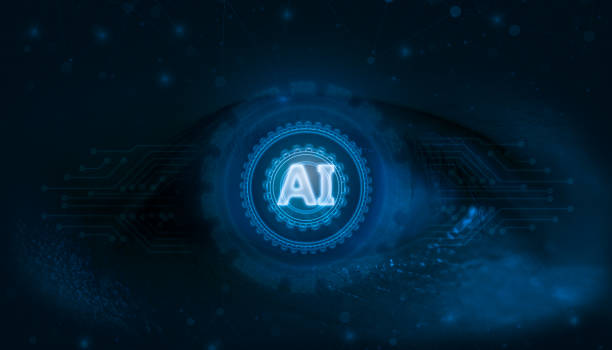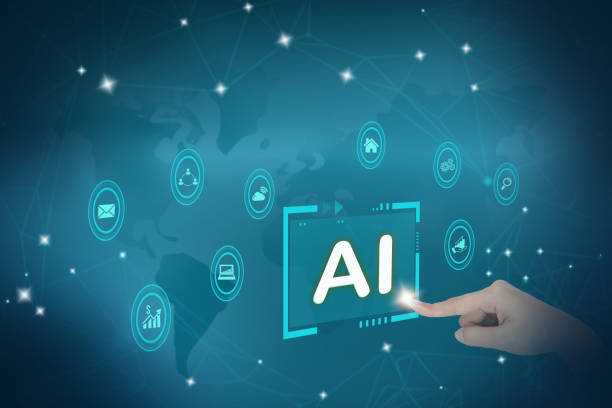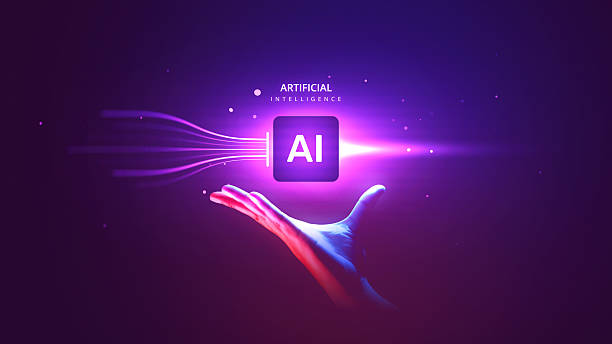What is Artificial Intelligence and how does it work?

What is Artificial Intelligence and how does it work?
#Artificial_Intelligence (AI) is a branch of computer science that deals with building machines capable of performing tasks that usually require human intelligence.
These tasks include learning, reasoning, problem-solving, understanding natural language, and pattern recognition.
Artificial intelligence seeks to implement these capabilities in computer systems.
These systems use various algorithms and models to simulate human cognitive processes.
Generally, artificial intelligence is based on two main concepts: machine learning and deep learning.
Machine learning allows machines to learn from data without being explicitly programmed.
Deep learning is a subset of machine learning that uses artificial neural networks with multiple layers to analyze data.
These networks are able to identify complex patterns in the data and make more intelligent decisions.
In other words, artificial intelligence allows machines to think and act like humans.
Artificial intelligence systems typically have a large database that provides the information needed for learning and decision-making.
Artificial intelligence algorithms analyze this data and create models that can be used for predictions, classifications, and other tasks.
For example, a face recognition system using deep learning algorithms can recognize different faces in images.
This system learns to identify the unique characteristics of each face using training data (images of different faces).
Applications of artificial intelligence include robotics, natural language processing, self-driving cars, recommendation systems, and medical diagnosis.
Artificial intelligence is evolving and has the potential to transform the way we live and work.
Tired of your online store not generating the revenue it should? Rasaweb, specializing in professional online store design, solves this problem forever!
✅ Increased sales rates and revenue
✅ High loading speed and exceptional user experience
⚡ Get a free consultation on online store design
Main Types of Artificial Intelligence: A Detailed Look

Main Types of Artificial Intelligence: A Detailed Look
Artificial intelligence can be divided into two main categories: Narrow AI and General AI.
Narrow AI, also known as weak artificial intelligence, is designed to perform specific tasks and specializes only in that area.
This type of artificial intelligence is not capable of performing tasks beyond what it was designed for.
Examples of narrow AI include face recognition systems, recommendation systems, and self-driving cars.
These systems perform very well in their tasks, but cannot do other things.
General AI, also known as strong artificial intelligence, is a type of artificial intelligence that is capable of understanding, learning, and performing any task that a human can do.
This type of artificial intelligence is still in the development stage and no complete strong artificial intelligence system has been built to date.
The main goal of developing strong artificial intelligence is to build machines that are capable of thinking and reasoning like humans and can make decisions in different situations.
In addition to these two main categories, artificial intelligence can also be categorized based on how it works.
Some artificial intelligence systems are designed based on rules and logic, while others use machine learning algorithms to learn from data.
Rule-based systems use a set of specific rules to make decisions.
These systems are usually used in areas where there are specific rules, such as legal systems.
Machine learning-based systems use various algorithms to analyze data and identify patterns.
These systems are able to improve their performance over time by receiving more data.
Ultimately, choosing the right type of artificial intelligence depends on the task we want to perform.
Narrow AI is suitable for performing specific and limited tasks, while strong AI is needed for performing complex and diverse tasks.
With the advancement of technology, it is expected that strong artificial intelligence will become a reality and create major changes in our lives.
Applications of Artificial Intelligence in Various Industries: Opportunities and Challenges

Applications of Artificial Intelligence in Various Industries: Opportunities and Challenges
Artificial intelligence is currently used in many different industries and has the potential to create fundamental changes in these industries.
In the healthcare industry, artificial intelligence is used for disease diagnosis, drug development, and providing personalized healthcare.
Artificial intelligence systems can analyze medical images and diagnose diseases with greater accuracy.
Also, these systems can develop new drugs to treat various diseases by analyzing genetic data.
In the financial industry, artificial intelligence is used for fraud detection, risk management, and providing personalized financial services.
Artificial intelligence systems can identify suspicious patterns in financial transactions and prevent fraud.
Also, these systems can assess various risks by analyzing financial data and provide appropriate strategies for managing these risks.
In addition, artificial intelligence can help provide personalized financial services to customers.
For example, an artificial intelligence system can analyze a customer’s financial situation and offer appropriate investment suggestions.
| Industry | Applications |
|---|---|
| Healthcare | Disease diagnosis, drug development |
| Financial | Fraud detection, risk management |
In the manufacturing industry, artificial intelligence is used to automate processes, improve product quality, and reduce costs.
Artificial intelligence systems can automate production processes and reduce the need for human labor.
Also, these systems can improve product quality and reduce costs by analyzing production data.
However, the use of artificial intelligence in various industries also comes with challenges.
One of these challenges is the shortage of skilled experts in the field of artificial intelligence.
To make optimal use of artificial intelligence, there is a need for experts who have sufficient knowledge and skills in this field.
Machine Learning and Deep Learning: Differences and Applications

Machine Learning and Deep Learning: Differences and Applications
Machine Learning and Deep Learning are two related concepts in the field of artificial intelligence, but there are fundamental differences between them.
Machine learning is a general approach to building systems that can learn from data without being explicitly programmed.
In machine learning, various algorithms are used to analyze data and identify patterns.
These algorithms can be used for predictions, classifications, and other tasks.
Deep learning is a subset of machine learning that uses artificial neural networks with multiple layers to analyze data.
These networks are able to identify complex patterns in the data and make more intelligent decisions.
The main difference between machine learning and deep learning is in how features are extracted from the data.
In machine learning, features are usually extracted manually by experts, while in deep learning, neural networks automatically extract features from the data.
Machine learning is used in many applications, including spam detection, recommendation systems, and fraud detection.
Deep learning is also used in applications such as face recognition, natural language processing, and self-driving cars.
The key point about artificial intelligence is that deep learning usually requires more data than machine learning.
This is because deep neural networks have a large number of parameters that must be learned from the data.
Also, deep learning usually requires more computational power than machine learning.
This is because training deep neural networks is a time-consuming and costly process.
However, deep learning performs better than machine learning in many cases.
This is because deep neural networks are able to identify more complex patterns in the data.
Ultimately, the choice between machine learning and deep learning depends on the task we want to perform and the amount of data and computational power available.
Research shows that 80% of customers trust companies with professional websites more. Does your current website inspire this trust?
With Rasaweb’s corporate website design services, solve the problem of customer distrust and poor online image forever!
✅ Create a professional image and increase customer trust
✅ Attract more sales leads and grow your business
⚡ Get a free consultation
The Future of Artificial Intelligence and its Impact on Human Life

The Future of Artificial Intelligence and its Impact on Human Life
The future of artificial intelligence looks very bright and it is expected that this technology will create major changes in human life in the coming years.
Artificial intelligence has a high potential to improve the quality of life, increase productivity, and solve complex problems.
With the advancement of technology, artificial intelligence systems will be able to perform more complex tasks and make better decisions.
One of the most important impacts of artificial intelligence on human life is the automation of many tasks.
Artificial intelligence systems can automatically perform many repetitive and tedious tasks, which allows humans to focus on more creative and important tasks.
This automation can lead to increased productivity and reduced costs.
However, automation can also lead to the loss of some jobs.
To address this challenge, there is a need to train and retrain the workforce for new jobs that are created by artificial intelligence.
Another impact of artificial intelligence on human life is the improvement of healthcare services.
Artificial intelligence systems can diagnose diseases with greater accuracy, develop new drugs, and provide personalized healthcare.
This can lead to increased longevity and improved quality of life.
For example, artificial intelligence systems can analyze genetic data and prescribe appropriate drugs for the treatment of various diseases to each individual.
Artificial intelligence can also create major changes in other areas such as education, transportation, and energy.
In education, artificial intelligence systems can provide personalized education to students and meet the learning needs of each individual.
In transportation, self-driving cars can increase road safety and reduce traffic.
In energy, artificial intelligence systems can optimize energy consumption and manage renewable energy sources more efficiently.
However, the development of artificial intelligence also comes with challenges.
One of these challenges is maintaining privacy and data security.
Artificial intelligence systems need a lot of data to learn and make decisions, which can lead to a violation of people’s privacy.
To address this challenge, there is a need for laws and regulations that protect people’s privacy.
Ethical Challenges of Artificial Intelligence and Solutions to Address Them

Ethical Challenges of Artificial Intelligence and Solutions to Address Them
The development of artificial intelligence comes with many ethical challenges that require attention and appropriate solutions.
One of the most important ethical challenges of artificial intelligence is discrimination.
Artificial intelligence systems may make discriminatory decisions due to the use of biased training data.
For example, a face recognition system may recognize faces of people with dark skin with less accuracy.
To address this challenge, there is a need for diverse training data and fair algorithms.
Another ethical challenge of artificial intelligence is accountability.
If an artificial intelligence system makes a wrong decision and causes damage, who will be responsible? Is the system developer, the system user, or the system itself responsible? To address this challenge, there is a need for laws and regulations that determine accountability for the decisions of artificial intelligence systems.
Also, there is a need for mechanisms that allow people to seek compensation in case of errors.
Privacy is also another ethical challenge of artificial intelligence.
Artificial intelligence systems need a lot of data to learn and make decisions, which can lead to a violation of people’s privacy.
To address this challenge, there is a need for laws and regulations that protect people’s privacy and allow people to control their data.
Also, there is a need for technologies that help preserve privacy while using artificial intelligence, such as encryption and private artificial intelligence.
In addition to these challenges, there are also concerns about the impact of artificial intelligence on employment and security.
The automation of many tasks can lead to the loss of some jobs.
Also, artificial intelligence systems may be used for malicious purposes such as automatic weapons.
To address these challenges, there is a need for careful planning and cooperation between governments, companies, and researchers.
Training and retraining the workforce, developing appropriate laws and regulations, and promoting the ethical use of artificial intelligence are among the measures that can help address these challenges.
The development of artificial intelligence should be such that its benefits are accessible to all members of society and its risks are minimized.
Artificial Intelligence Development Tools: Introduction and Comparison

Artificial Intelligence Development Tools: Introduction and Comparison
The development of artificial intelligence requires the use of various tools and libraries that help developers create and train artificial intelligence models more effectively.
Some of the most popular artificial intelligence development tools include TensorFlow, PyTorch, and scikit-learn.
TensorFlow is an open-source library developed by Google.
This library is used to build and train machine learning and deep learning models.
TensorFlow supports various programming languages such as Python, Java, and C++.
PyTorch is also an open-source library developed by Facebook.
This library is also used to build and train machine learning and deep learning models.
PyTorch is very popular among researchers and developers due to its flexibility and ease of use.
PyTorch supports the Python programming language.
scikit-learn is an open-source library that is used for machine learning.
This library includes various algorithms for classification, regression, clustering, and dimensionality reduction.
scikit-learn is suitable for small and medium-sized machine learning projects due to its simplicity and ease of use.
scikit-learn supports the Python programming language.
In addition to these libraries, there are other tools for artificial intelligence development, such as Keras, Theano, and Caffe.
Keras is a high-level API that runs on TensorFlow, PyTorch, and Theano.
This API helps developers create machine learning models more quickly and easily.
Theano is an open-source library that is used for numerical computations.
This library is also used to build and train deep learning models.
Caffe is an open-source library that is used for deep learning.
This library is suitable for large deep learning projects due to its high speed and scalability.
Choosing the right tool for artificial intelligence development depends on the needs of the project and the skills of the developer.
Programming Languages Used in Artificial Intelligence

Programming Languages Used in Artificial Intelligence
Programming languages play an important role in the development of artificial intelligence.
Some of the most popular programming languages used in artificial intelligence include Python, R, Java, and C++.
Python is known as the primary language for artificial intelligence development due to its simplicity, flexibility, and the existence of numerous libraries.
Libraries such as TensorFlow, PyTorch, scikit-learn, and Keras are written in Python and have made the use of Python for artificial intelligence development very easy.
R is also a popular programming language for statistics and data analysis.
This language has numerous libraries for machine learning and data mining.
R is suitable for projects that require accurate data analysis due to its strong statistical capabilities.
Java is an object-oriented programming language that is suitable for developing enterprise applications due to its stability and scalability.
Java has libraries for machine learning and natural language processing.
Java is suitable for projects that need to implement artificial intelligence in large systems.
| Programming Language | Applications in Artificial Intelligence |
|---|---|
| Python | Machine learning, deep learning |
| R | Data analysis, statistics |
| Java | Enterprise applications |
C++ is a low-level programming language that is suitable for developing operating systems and video games due to its high speed.
C++ has libraries for machine learning and computer vision.
C++ is suitable for projects that require high performance and precise control over hardware.
Choosing the right programming language for artificial intelligence development depends on the needs of the project and the skills of the developer.
However, Python is known as the primary language for artificial intelligence development due to its simplicity and the existence of numerous libraries.
Does your company website perform as well as your brand deserves? In today’s competitive world, your website is your most important online tool. Rasaweb, specializing in professional corporate website design, helps you to:
✅ Gain customer trust and credibility
✅ Convert website visitors into customers
⚡ Get a free consultation!
Artificial Intelligence Learning Resources: Top Courses and Books

Artificial Intelligence Learning Resources: Top Courses and Books
Learning artificial intelligence requires the use of appropriate educational resources.
Fortunately, there are numerous educational resources for learning artificial intelligence, including online courses, books, and scientific articles.
Some of the top online courses for learning artificial intelligence include courses offered by Coursera, edX, and Udacity.
These courses are taught by leading university professors and industry experts and cover various topics in artificial intelligence.
Coursera offers numerous courses in the field of artificial intelligence, including courses on machine learning, deep learning, and natural language processing.
edX also offers similar courses, including courses on artificial intelligence, robotics, and computer vision.
Udacity also offers online Nanodegree courses that help people acquire the skills needed for jobs in the field of artificial intelligence.
In addition to online courses, there are numerous books for learning artificial intelligence.
Some of the top books in this field include “Artificial Intelligence: A Modern Approach” by Stuart Russell and Peter Norvig, “Machine Learning” by Tom Mitchell, and “Deep Learning” by Ian Goodfellow, Yoshua Bengio, and Aaron Courville.
These books comprehensively cover various topics in artificial intelligence and are suitable for students and researchers.
In addition to courses and books, scientific articles are also a valuable source for learning artificial intelligence.
Scientific articles provide the latest achievements in artificial intelligence and help people stay abreast of developments in this field.
Scientific databases such as arXiv, IEEE Xplore, and ACM Digital Library can be used to access scientific articles.
By using these educational resources, people can acquire the knowledge and skills needed to enter the field of artificial intelligence.
Case Study: Successful Artificial Intelligence Projects in Iran

Case Study: Successful Artificial Intelligence Projects in Iran
Artificial intelligence is also developing in Iran and successful projects have been carried out in this field.
One of the successful artificial intelligence projects in Iran is the development of a face recognition system by knowledge-based companies.
These systems are able to recognize people’s faces with high accuracy and are used in applications such as security, access control, and marketing.
Another successful artificial intelligence project in Iran is the development of recommendation systems by e-commerce companies.
These systems are able to recommend appropriate products and services to customers by analyzing customer purchase data and increase sales.
These systems allow artificial intelligence to provide a personalized experience for customers by analyzing their behavior accurately.
Iranian knowledge-based companies have also been remarkably active in the field of natural language processing.
These companies have developed systems that are able to analyze, translate, and answer questions in Persian texts.
These systems are used in applications such as information retrieval, customer service, and education.
For example, a natural language processing system can answer users’ questions about a company’s products and services.
In addition to these projects, other projects are also underway in the field of artificial intelligence in Iran, including the development of smart systems for traffic management, disease detection systems, and smart agricultural systems.
These projects show that artificial intelligence in Iran has a high potential to create positive changes.
To support the development of artificial intelligence in Iran, there is a need for investment in research and development, training a skilled workforce, and creating appropriate infrastructure.
With appropriate support, artificial intelligence can play an important role in the economic and social development of Iran.
Frequently Asked Questions
| Question | Answer |
|---|---|
| 1. What is Artificial Intelligence (AI)? | It is a branch of computer science that aims to create machines capable of simulating human intelligence and performing tasks that require human thinking, such as learning, problem solving, and decision making. |
| 2. What are the main types of artificial intelligence? | They can be classified into Weak Artificial Intelligence (Narrow AI) that focuses on a specific task, General Artificial Intelligence (General AI) that possesses comprehensive human capabilities, and Super Artificial Intelligence (Super AI) that exceeds human intelligence. |
| 3. Mention some common applications of artificial intelligence in our daily lives. | These include voice assistants (such as Siri and Alexa), recommendation systems (such as Netflix and Amazon), self-driving cars, face recognition systems, and spam filters. |
| 4. What is the difference between artificial intelligence and machine learning? | Artificial intelligence is the broader concept of creating intelligent machines, while machine learning is a subset of artificial intelligence that focuses on enabling systems to learn from data without explicit programming. |
| 5. What is Deep Learning? | It is a subset of machine learning that uses multilayer artificial neural networks (deep neural networks) to process data and discover complex patterns, and is used in image and speech recognition. |
| 6. What are the main benefits of artificial intelligence? | Improving efficiency and productivity, automating repetitive tasks, making better decisions based on analyzing big data, and developing solutions to complex problems in fields such as medicine and science. |
| 7. What are the main challenges facing the development and deployment of artificial intelligence? | These include the need for vast amounts of high-quality data, privacy and security issues, bias in data and algorithms, and high development and maintenance costs. |
| 8. Does artificial intelligence raise ethical or social concerns? | Yes, it raises concerns related to privacy, algorithmic bias, job loss due to automation, responsibility for errors committed by smart systems, and the need for a regulatory framework. |
| 9. How can artificial intelligence affect the future of the labor market? | It can lead to the automation of some routine jobs, but it will also create new jobs that require advanced skills in the development, operation, and maintenance of artificial intelligence systems. |
| 10. What are some modern or promising technologies in the field of artificial intelligence? | These include advanced natural language processing (NLP) (such as large language models like ChatGPT), computer vision, robotics, and generative artificial intelligence (Generative AI). |
And other services of Rasa Web Advertising Agency in the field of advertising
Intelligent Google Ads: A new service to increase website visits by customizing the user experience.
Intelligent Digital Branding: Designed for businesses looking to engage users through attractive user interface design.
Intelligent SEO: An exclusive service for growing campaign management based on the use of real data.
Intelligent Marketplace: A creative platform to improve customer behavior analysis with dedicated programming.
Intelligent Social Media: A new service to increase digital branding through the use of real data.
And more than hundreds of other services in the field of internet advertising, advertising consulting and organizational solutions
Internet Advertising | Advertising Strategy | Advertorial
Resources
What is artificial intelligence and how does it work?
, The rapid growth of artificial intelligence in the shadow of the latest increases and threats
, What roles does artificial intelligence play in our lives
,



